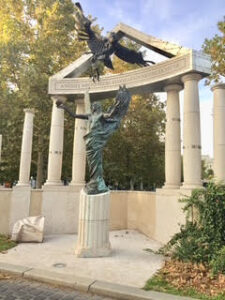This is a guest post by Ulf Hedetoft, author of The Morality of Politics: States, Honour and War
Today everyone is a moralist. Citizens as well as politicians routinely draw lines between good and bad, between who they side with and who they regard as enemies. They know – or at least feel – that Putin is a despicable dictator and Zelenskyy a fighter for freedom and democracy. That they live in a world where they – thank God – are allowed to elect their leaders, who subsequently do what they can to secure their life and happiness. That rooting for your country, in sport and war, is admirable, while criticising your nation is not. That lying, cheating and stealing is bad, whereas leading a modest and law-abiding life is virtuous. That you should not envy the rich and powerful, but rather be thankful for what they contribute to our welfare, growth and national unity. That bringing up children, working hard and paying your taxes should be your own contribution to the same project; etc.
All this – and much more – seems so self-evident to citizens that they rarely reflect on the nature of their moral being, nor on why they themselves frequently overstep the line and commit breaches against the moral code. When they do so, they admittedly often do it with a guilty conscience, but this does not keep them from holding their fellow citizens on a tight moral leash and exposing their hypocrisy. The same applies to public debates, which use moral judgments liberally, but hardly ever examine their rationale. Moralism, in other words, is there to be accepted and applied as a normative guideline for evaluation and behaviour, but not to be investigated for what it is.
My book deals with the morality, honour and self-conception of states and people, all of which goes well beyond the narrow, rationalist defence of national interests, which dominates most IR studies. The honour of states rests on the idealised conception of ‘all of us’, which includes all citizens, all classes and all generations, set against their opposite numbers outside of ‘our’ immediate sphere of domination. This state-based image of itself and its existential teleology constitutes its very essence, notwithstanding that it is often seen as a deviation from the normal state of affairs.
Modern states basically have three goals in mind when carrying out their tasks: defending their interests, often disguised as ‘rights’; asserting their identities; and upholding their honour. All three have material as well as ideational components, and all three are an amalgamation of external and internal constituents. The triad bears echoes of the Thucydidean trichotomy of fear, honour and interest, which represented the main drivers of state behaviour in the classical era.
This volume – which is particularly topical given the current belligerent state of Europe and the global struggle for hegemony – pursues this line of thinking along three interconnected routes. The first chapter delves into the morality question itself, tackling the complex relationship between politics, law and morals, and between states and citizens. The universe of moral judgments feeds off rigid distinctions between good and bad, Us and the Other. Political actors support it, law legitimates it, and citizens enact it.
The second chapter deals with the question of the honour and prestige of states, historically and conceptually. This is a question that has mostly been ignored, downplayed or misconceived by international relations theories, but which has now shown its renewed relevance and cries out for an explanation. I argue not just that the honour of states matters but also that whereas states in peacetime are mainly the servant of national economies, in wars the relationship is turned upside down. This is when fighting for national honour becomes the core issue, which sidelines all other political objectives and demonstrates the indispensable role of national morality.
In the third chapter, I therefore tackle the question of war, peace and morality head-on. I start by proposing ten theses on the relationship between war and peace. The basic theorem is that war and peace are not contradictory but complementary: reasons for war are produced in times of peace. Both Kant’s thesis on ‘perpetual peace’ and its modern corollary, that democracies do not go to war against each other, are seen as fallacious. The chapter ends by addressing the question of the background and rationale of the war in Ukraine, in the process critiquing the moral stance characterising the Western understanding of the conflict.
The Morality of Politics: States, Honour and War demonstrates the interconnectedness of moral bias and political power in democratic societies. For democratic politicians, morality is both instrumental and personally normative. It is an instrument to ensure that citizens properly internalise the behavioural ‘code’ matching politicians’ social and political goals, such as ‘personal responsibility, personal initiative, self-respect and respect for others and their property’ (Margaret Thatcher). In domestic dealings with their power, they try themselves to observe such moral guidelines. In foreign politics, things are slightly different. Not only can politicians here legitimately ‘dirty their hands’ in the pursuit of higher goals, but war is the very touchstone of their moral normativity, the point at which good must in the end conquer evil, and where they are judged by higher standards than simply helping to protect private property and accelerate ‘growth’.
Thus, the enormous benefit of morality is this: it ensures that democratic states receive all the partial bias and undivided support they could wish for and that the states themselves appear as paragons of virtue rather than international actors with dirty hands and a sullied track record.

